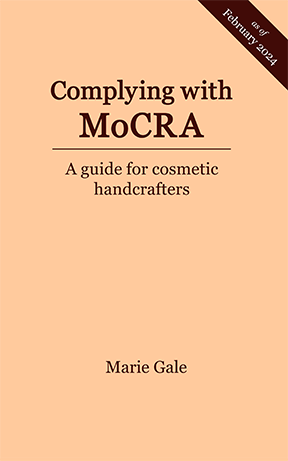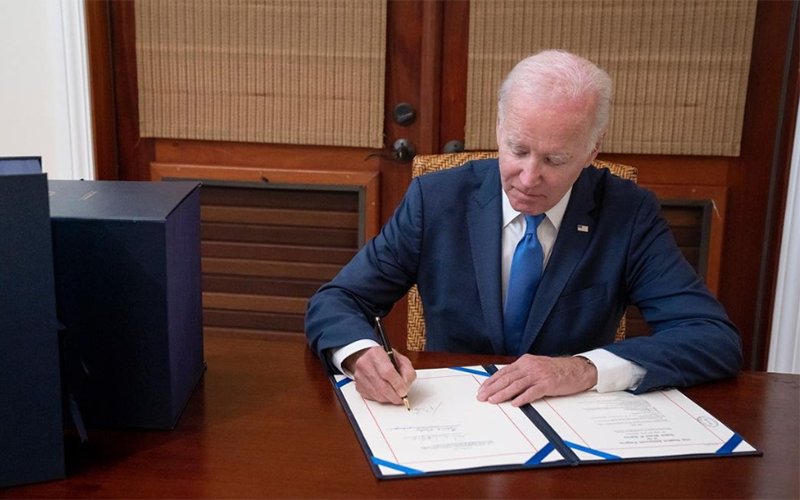On December 29, 2022, President Joe Biden signed the 4,500 page Consolidated Appropriations Act, 2023. Included in the bill is the “Modernization of Cosmetics Regulation Act of 2022” which updates the cosmetic sections of the Food Drug and Cosmetic Act for the first time in over 50 years. I’ve outlined the basic requirements of each new section below.
Over the next several years the FDA will go through the rule-making process to create detailed regulations to implement all of these new provisions of the Food Drug and Cosmetic Act.
Generally, all the provisions of the act will go into effect 1 year after it is enacted.
Small Business
The good news is that as a result of 14 years of hard work by the Handcrafted Soap and Cosmetic Guild and allied entities, there are provisions which protect small cosmetic businesses!
Thank you, HSCG, for protecting our interests!
Small business is defined as a business with less than $1 million average gross annual sales in the US for cosmetic products for the previous 3 year period.
To qualify, the small business may not manufacture cosmetic products that:
- Come in contact with the mucous membrane of the eye (the surface of the eyeball and the inside of the eyelids);
- Are injected;
- Are intended for internal use
- Are intended to alter the appearance for more than 24 hours and removal by the consumer is not customary or usual.
Safety Substantiation
Applies to all cosmetic manufacturers.
Cosmetic products must have adequate safety substantiation.
“Adequate safety substantiation” means tests or studies, research, analyses, or other evidence or information that is considered sufficient to support a “reasonable certainty” that a cosmetic product is safe.
“Safe” means that the product, including the ingredients, is not injurious to users when used as directed or as customary or usual.
The regulations to be issued will likely give more clarification. However, based on previous statements by the FDA, using only ingredients that are known to be safe is likely one way to prove safety. If you make products that use a preservative system, consider how to substantiate that the system is sufficient to keep the product safe and unadulterated.
Adverse Events
Applies to all cosmetic manufacturers.
Any serious adverse event MUST be reported.
This is new. Before this legislation cosmetic manufacturers were not required to report serious adverse events. This section applies to all cosmetic manufacturers.
Keep all records of any reported adverse events.
A serious adverse event is defined as death, a life-threatening experience, inpatient hospitalization, a persistent or significant disability or incapacity, a congenital anomaly or birth defect, an infection, or a significant disfigurements (such as serious and persistent rashes, second or third degree burns, significant hair loss), OR an event that requires medical or surgical intervention to prevent a serious adverse event.
Small businesses (less than $1 million in sales) must keep records for 3 years. Larger businesses must keep records for 6 years.
Allow Inspections.
If you have had to report a serious adverse event, you must permit an authorized person from the FDA to inspect your records.
Labeling
Applies to all cosmetic manufacturers.
Contact information for adverse event reports.
The label must include a way to receive an adverse event report. It can be a domestic address, domestic phone number or electronic contact information (website or email). This appears to mean that if the full street address is not on the label, then an alternative (phone or electronic) method of contact must be provided.
This doesn’t look like it changes the current business name and address requirements (which are detailed in the Fair Packaging and Labeling Act). However, during the rule-making process it may be possible to get changes to the requirements for omitting the street address from the label.
This labeling requirement will go into effect in 2 years.
Fragrance allergens must be listed on the label.
The FDA is being required to create regulations that say which fragrance allergens must be included on the label. They have 18 months to issue a notice of rulemaking, and 180 days after the close of comments to issue a final rule (so it will take about 2 years). In making the rules, the FDA is to consider existing international, state, and local requirements, including the existing EU rules.
In order to maintain global harmonization, in all likelihood, the regulations will end up somewhat similar to the EU requirements.
Good Manufacturing Practices
Small businesses are exempt.
Follow good manufacturing practices.
The FDA is being required to establish regulations for good manufacturing practices for cosmetics. This is similar to how food, drugs, and medical devices are handled. They must publish a notice of proposed rulemaking within 2 years, and must publish final rules within 3 years. The rules must take smaller businesses into consideration.
Once the rules are in place, it will be prohibited to sell cosmetics that are made in a facility that is not in compliance with the good manufacturing practices regulations.
Business Registration and Product Listing
Small businesses are exempt.
Existing and new manufacturing facilities must register with the FDA.
Currently registration for cosmetic facilities is voluntary. MoCRA makes the registration required.
Facilities in existence now will have 1 year to register. After the first year, new facilities must register within 60 days of engaging in activity. Registrations must be updated within 60 days if there are changes. Registrations must be renewed every two years. There are some additional provisions which apply when a company’s cosmetics are manufactured by a contract manufacturer.
A cosmetic product listing must be submitted for each product manufactured.
Cosmetic product listing are currently voluntary. MoCRA makes them required.
Cosmetic product listings for existing products must be submitted within 1 year. New products must be sumitted within 120 days of marketing the product. Any updates must be made annually.
A single listing submission for a cosmetic product may include multiple products if they only differ in color, fragrance, flavor, or quantity of contents.
The FDA can suspend registration of a facility.
The FDA can suspend the registration of a facility if they determine that there is a “reasonable probability” that product(s) produced in the facility may cause serious adverse health consequences or death. Once suspended, no products made in the facility may be entered into commerce.
There are a number of provisions for providing notice, allowing for hearings, and the like.
General Records Inspection
Applies to all cosmetic manufacturers.
The FDA will have rights to inspect records of cosmetic products..
The FDA already has the right to inspect cosmetic manufacturing facilities if they “reasonably believe” that a product or the products manufactured in a facility could pose a threat of serious harm. Inspection of the RECORDS was not included in the previous law, so it is being added now.
Mandatory Recall Authority
Applies to all cosmetic manufacturers.
The FDA can REQUIRE that a cosmetic product be recalled.
Prior to now, the FDA only had the authority to request that a company voluntarily recall a cosmetic product. MoCRA gives the FDA the authority to require that a company cease distribution and/or recall a product if they won’t voluntarily do so.
There are a number of administrative procedures in the law, including notice, hearings and such.
Preemption
Preemption means that the federal law will supercede or displace the law of a lower authority.
No state may establish or continue in effect any law, regulation, order, or other requirement for cosmetics that is different from or in addition to, or not otherwise identical with the provisions of this new law with regards to registration and product listing, good manufacturing practices, records, recalls, adverse event reporting, or safety substantiation..
This is actually a pretty big deal!
When it comes to cosmetics, most states have adopted state-level laws that essentially mirror the federal laws. There are a few states, however, that have implemented additional laws or regulations that address cosmetic facility registration, cosmetic product listing, and/or good manufacturing practices. Florida, in particular comes to mind. It will be interesting to see how this plays out.
Additional Requirements for the FDA
There are some additional requirements for the FDA.
Talc Testing
Within 1 year the FDA must propose regulations to establish and require standardized testing methods for detecting and identifying asbestos in talc-containing products. Final rules must be issued within 180 days of the close of the comment period. So they have about 2 years to come up with final rules.
PFAs
The FDA has been given the task of assessing the use and safety of perfluoroalkyl and polyfluoroalkyls (PFAs) in cosmetic products . They have 3 years to publish a report on the FDA web site.

Shameless plug!
To find out how MoCRA applies to you, what you need to do, and when you need to do it by, get my book from Amazon and use it.
Up to date as of May 2024.


Leave a Reply